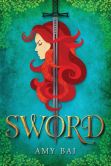Sword, by Amy Bai

For over a thousand years, the kingdom of Lardan has been at peace: isolated from the world, slowly forgetting the wild and deadly magic of its origins. Now the deepest truths of the past and the darkest predictions for the future survive only in the verses of nursery rhymes. And prophecies are just nursery rhymes for gullible fools. Right?
So thinks Kyali Corwynall, daughter of the Lord General and the court’s only sword-wielding girl. She’s never bothered believing in faery stories. But one day, an old nursery rhyme she’s heard since childhood begins to come true, naming her as Sword and her brother and best friend as Song and Crown, saviors of the kingdom. When that ancient magic wakes, the future changes for everyone. In the space of a single night, her life unravels into violence and chaos.
The opening few chapters felt a little slow to me, mostly because what I was reading seemed familiar. We’re introduced to Kyali and her skill with fighting and swordplay, her brother Devin and his bardic magic, and their close friend the Princess Taireasa. But once the plot picked up, I was hooked hard. Much of the book made me feel like a kid again, getting caught up in the excitement and the battles and the prophecies and the characters and their relationships. It hits many of the notes of a good page-turning fantasy.
That brings up my other stumbling point, because while I love the tropes of fantasy and I’m generally thrilled to revisit them, there are a few I could do without. Early on, Kyali finds herself holding a room against multiple enemies while the princess escapes. They ask where the princess has gone, and naturally she refuses, which leads to this exchange.
“I think you will tell us eventually, general’s daughter.”
His meaning was plain.
Oh, gods, she thought — death, she had braced herself for. This possibility had never occurred to her.
She would just have to find a way to die, then. After she killed as many of these as came near her.
I almost stopped reading here. Not because the scene was bad or badly written, nor did it feel gratuitous. It’s simply not something I wanted to read.
But I kept reading, and I’m glad I did. The consequences to Kyali are intense, and shape her character for the rest of the book. But her internal struggle isn’t solely from the implied sexual assault (it’s never explicitly spelled out). There’s another kind of trauma related to her magic, and that turns her into…not a stone cold warrior, but a woman trying desperately to project that coldness in order to protect the people closest to her.
I enjoyed the use of prophecy. It’s another trope, but something about the way Bai wrote the story brought new energy to the idea. Prophecy isn’t a mysterious riddle. It’s not a set of plot coupons to be collected. Its a burden. It’s as much a mystery to be unraveled and understood as the political machinations and the clashes between armies. And it puts Kyali in the role of warrior, with her brother as the bard, which was a nice reversal.
The secondary characters were interesting and engaging. (For those who’ve read it, am I the only one who was shipping Devin and Prince Kinsey?) There’s a lot going on in this book, and all of the players fit the story, and were people I wanted to read about.
There’s an energy to the story that’s hard to describe. It might be a first novel thing. You should take this bit with a grain of salt, because I’m pretending to read the author’s mind, and that often ends badly…but reading the book, I could almost feel how excited the author was to share the story and these characters. That excitement and love and affects my own reading, which is a good thing.
Sword is book one in what I’m guessing will be a trilogy, so the end of the book isn’t the end of the story. No cliffhanger ending though, which I appreciate.
Overall, I think it’s a good book. I also recognize that some elements may not be to everyone’s taste.
The first twenty-four pages are available online, if you’d like to check it out.






Kassie
April 23, 2015 @ 4:57 pm
I know this kind of thing is hard to pin down, but what’s your feeling on the appropriate age range? I have a 10 year old niece who reads on about an 8th grade level, and it’s always hard to find things written at her level that are age-appropriate for her. Thanks!